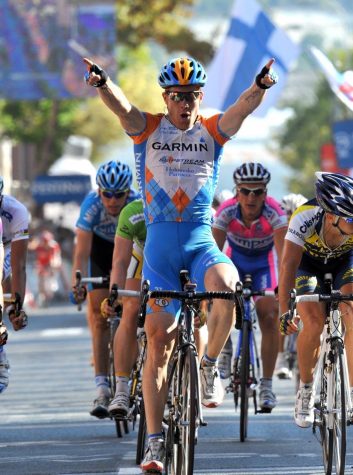Fantasy Football
Why every guy questions his friendships come September
It’s a fine Sunday afternoon, 11 boys are crowded around a television, though most of them aren’t even paying attention to the screen. They are engrossed in their phones, occasionally looking up to exchange profanities. Then the three or four watching begin to say things such as, “Uh oh,” “Oh s—,” and then everyone joins for one long, extended, “OHHHHH!” as Adrian Peterson of the Minnesota Vikings scrambles 80 yards for a touchdown. Some cheer with excitement, others sigh and hang their heads. Why? Because this group of boys is partaking in the massive online game, Fantasy Football.
The roots of Fantasy Football date back to the 1960s, when the inaugural draft was held in the home of Wilfred “Bill” Winkenbach, a limited partner in the Oakland Raiders according to Michael Fabiano’s Fantasy Football 101. The game slowly spread throughout the Bay Area, eventually stretching to the border of California and beyond. The complexity of the scoring system in the pre-computer era hindered the game’s potential, consequently hampering the game’s growth. But like most things, Fantasy Football was forever changed when the Internet came along.
In 1997, CBS launched a beta version of the first free Fantasy Football website. The game was an immediate hit. In three years time most every major sports media website offered some form of Fantasy Football. From then on it has only continued to grow. According to NBC Sports, it is estimated that more than 23 million people compete in public and private leagues online nationally.
As much of a part of the NFL that Fantasy Football has become, there are many players who express bitterness towards it. Often these feelings are expressed via Twitter, such as this tweet from Tennessee Titans halfback Chris Johnson, “Public service announcement: I can care less about fantasy football. Key word: fantasy. As long as we win I’m happy. [If] I rush for 200 [yards] n lose y’all happy.” Or this one from Baltimore Ravens halfback Ray Rice in response to receiving many complaints about his performance from Fantasy Football players, “I was a fan of fantasy football until today so many spiteful and hateful words I still love you all God Bless great win today.”
From an economic standpoint, Fantasy Football has quite the impact as well. On its own, Fantasy Football is a $1 billion business, according to Fantasy Sports Trade Association. But indirectly, it also presents a negative affect. After bringing unemployment into consideration, Challenger, Gray & Christmas estimates that 22.3 million employed Fantasy Football owners spend at least an hour a week managing and adjusting their rosters. According to U.S. Bureau of Labor Statistics, $19.33 is the average hourly wage, the result is $430.9 million lost per week, or $6.5 billion over the course of a 15-week fantasy season.
In spite of these numbers, Challenger, Gray & Christmas swear the effects of Fantasy Football are a “blip on the economic radar,” and that the study is “non-scientific” and “very rough.”
Fantasy Football fanatics can easily be found within the walls of Wenatchee High School as well. Fantasy Football is a great way to interact with my friends with good vibes and really get to know each other. We get along great and don’t make fun of each other. Especially not Brock (Stone),” said owner of the team Da Bears, senior Kevin Wieczorek.
For some though, Fantasy Football evokes feelings of anguish and frustration,.“Honestly, my league makes me debate friendships, we’re all a——-,” said Stone, the owner of Mooseknuckles.
“Chill out Brock, there’s always next year,” said owner of “Hernanded,” senior Zach Larsen.






